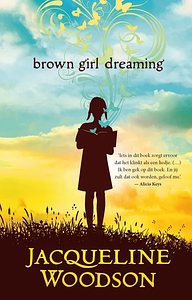Take a photo of a barcode or cover
A free verse story based in the 60s and 70s and still so relevant today. Growing up in South in the 90s also mirrored this experience for me. I really enjoyed the "how to listen" haikus throughout the story.
This one hit home:
"In the stores downtown
we're always followed around
just because we're brown."
As an English teacher, a stanza resonated with me:
"If someone had taken
that book out of my hand
said, 'You're too old for this'
maybe
I'd never have believed
that someone who looked like me
could be in the pages of the book
that someone who looked like me
had a story." (p. 228)
I only hope that I don't make my students feel as if they are restricted to what they should read for enjoyment.
This one hit home:
"In the stores downtown
we're always followed around
just because we're brown."
As an English teacher, a stanza resonated with me:
"If someone had taken
that book out of my hand
said, 'You're too old for this'
maybe
I'd never have believed
that someone who looked like me
could be in the pages of the book
that someone who looked like me
had a story." (p. 228)
I only hope that I don't make my students feel as if they are restricted to what they should read for enjoyment.
I’m still not sure if I enjoy reading books written in verse. However, Jacqueline Woodson’s story was beautiful.
Beautiful, emotional, and poetic: Jacqueline Woodson chose each memory and each word perfectly to represent so many memories of being Black in the 1950s and 60s. I’d recommend for any fans of books in verse!
What a perfect way to spend the holiday...reading a lovely American story. This book was beautifully written. You can tell the author is a poet at heart. She wraps so much of the day to day history into her real life growing up as an African-American child in the 1960's and 1970's in a way that a child would remember but also in a powerful way for an adult, like myself to read. I will be looking for more of her work. My favorite line: "How did you do that, my classmates ask. How did you memorize all those words? But I just shrug, not knowing what to say. How can I explain to anyone that stories are like air to me, I breathe them in and let them out over and over again."
I read Another Brooklyn recently and loved it so I had to pick up Woodson’s memoir in verse. Woodson does a great job not just describing what is happening around her, but allowing you to feel with her. 4/5🌟
Oh my....this is one of the best books I have read in a long time. Poignant, beautifully written. Woodson carefully crafts a powerful unfolding of her youth in relatively "few" words. I LOVE this book!
Inspiring.
Inspiring.
As beautiful as all of this authors writing. I thoroughly enjoyed it. I loved learning her personal history.
When people first ask what type of books or literature I like reading, my first response is poetry. This book was not only enjoyable because it was written in poetic verse, but because the storytelling was fluid and filled with imagery.
In this poetic memoir, Jacqueline Woodson recalls her childhood: born in Ohio, and raised in the South before moving to New York City.
Named after her father, Woodson begins by providing background information of the tumultuous time that occurred between her parents after her birth, resulting in her mother loading up their three children and herself to move back down to the South and live with her parents.
There's the idea of changing the way African Americans are perceived in the 1960s and 1970s through the eyes of an African American child, which is much different than history books, or the adult essays of the time.
It is through the innocent eyes of Woodson that the reader sees how she doesn't understand that the color of her skin excludes her from certain liberties in life, or certain advantages. And,this idea, ladies and gentlemen, breaks my heart.
I don't understand racism--and I'm not talking about the denotation, I'm referring to connotation. Since I'm not a POC, I've never been taught to keep my eyes down, had to sit at the back of the bus, or forced to wait in a long line at a store because of how I look.
And that is what makes that book phenomenal. The reader gets a peek at what life was like for a young African American girl trying to be successful in a society that has been taught to suppress her.
Geared for middle readers, ages 10+, although I wouldn't hesitate to read this with my seven-year-old, the memoir can be a great tool to begin discussions about racism and the Civil Rights Movement, and even about Jim Crow Laws. In fact, one could even teach their children about slavery, because Woodson's grandfather, whom she called Daddy, was one generation removed from slavery.
And, the teaching doesn't stop there. Family issues are brought up many times in the memoir, from the children being raised by their grandparents for awhile, to then moving to New York City to live with their mother, to having another sibling, to the youngest child getting lead poisoning from eating paint, the idea of social justice runs deep.
RATED: 5 Stars
NOTE: I bought and paid for the book on my own, and did not receive any compensation for this review.
In this poetic memoir, Jacqueline Woodson recalls her childhood: born in Ohio, and raised in the South before moving to New York City.
Named after her father, Woodson begins by providing background information of the tumultuous time that occurred between her parents after her birth, resulting in her mother loading up their three children and herself to move back down to the South and live with her parents.
There's the idea of changing the way African Americans are perceived in the 1960s and 1970s through the eyes of an African American child, which is much different than history books, or the adult essays of the time.
It is through the innocent eyes of Woodson that the reader sees how she doesn't understand that the color of her skin excludes her from certain liberties in life, or certain advantages. And,this idea, ladies and gentlemen, breaks my heart.
I don't understand racism--and I'm not talking about the denotation, I'm referring to connotation. Since I'm not a POC, I've never been taught to keep my eyes down, had to sit at the back of the bus, or forced to wait in a long line at a store because of how I look.
And that is what makes that book phenomenal. The reader gets a peek at what life was like for a young African American girl trying to be successful in a society that has been taught to suppress her.
Geared for middle readers, ages 10+, although I wouldn't hesitate to read this with my seven-year-old, the memoir can be a great tool to begin discussions about racism and the Civil Rights Movement, and even about Jim Crow Laws. In fact, one could even teach their children about slavery, because Woodson's grandfather, whom she called Daddy, was one generation removed from slavery.
And, the teaching doesn't stop there. Family issues are brought up many times in the memoir, from the children being raised by their grandparents for awhile, to then moving to New York City to live with their mother, to having another sibling, to the youngest child getting lead poisoning from eating paint, the idea of social justice runs deep.
RATED: 5 Stars
NOTE: I bought and paid for the book on my own, and did not receive any compensation for this review.
A beautiful memoir, poems that penetrate the heart.
10 bubble gum cigarettes out of 10.
10 bubble gum cigarettes out of 10.





